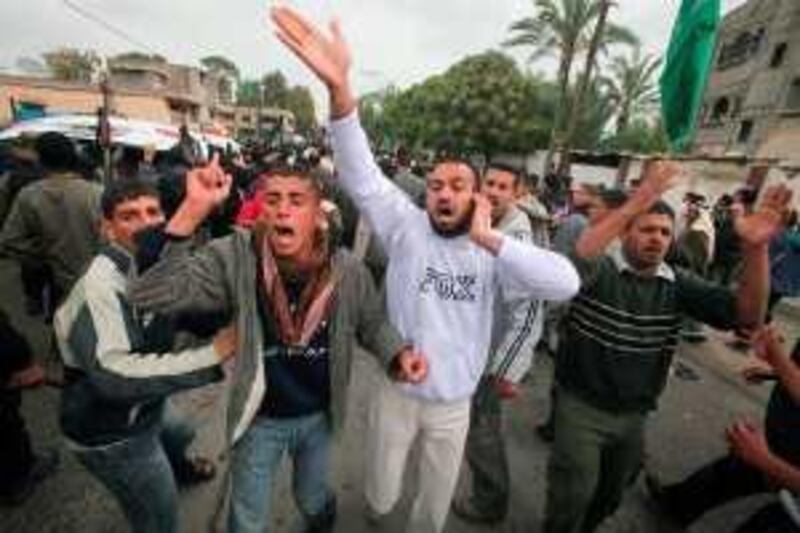KHAN YOUNIS, GAZA // Two Israeli soldiers and at least one Palestinian were killed in the Gaza Strip on Friday, in the fiercest bout of fighting since last year's war, and one that residents fear may pull the embattled territory into a new cycle of violence. For the first time since Israeli forces invaded Gaza in December 2008, Hamas, which rules the Gaza Strip, claimed members of its military wing, the al Qassam Brigades, were involved in the clashes with Israeli soldiers, reversing its year-long policy of avoiding such confrontations along its 45km border with Israel.
The fresh battle comes on the heels of a spate of tit-for-tat attacks, with militants firing rockets at Israeli towns, and Israel retaliating with air raids on tunnels and metal workshops in recent weeks. "Members of the al Qassam Brigades were engaged in the fighting, when the Israelis tried to enter Gaza, and Hamas responded," said the Hamas government spokesman, Taher al Nounou. "The Israelis are the ones that decided to escalate the situation."
Hamas has controlled the Gaza Strip since it ousted fighters loyal to its secular rival, Fatah, in June 2007. Friday's clashes began when Israeli troops crossed into the Gaza Strip east of the southern city of Khan Younis, prompting Palestinian militants to open fire and widening into an apparent gun and artillery battle that left two Israeli soldiers dead and another two wounded. Israeli army officials say soldiers entered Gaza to dismantle explosives placed by Palestinian fighters along the border, while local fighters claim they ambushed the armoured Israeli convoy in an act of self-defence after it invaded Palestinian territory. Civilian witnesses at the scene said they watched militants plant an explosive in an effort to lure the Israeli soldiers into Gaza.
Later on Friday night, Israeli tanks re-entered the area "to remove infrastructure used by the terrorists to carry out another attack", an Israeli army spokeswoman said. Subsequent artillery fire killed 23-year-old Haithem Arafat in a Khan Younis-area village close to the Israeli border, but conflicting reports label him as both a civilian and a militant in the Islamic Jihad movement, which claims its members were also involved in the clashes.
The Israeli army said its troops on the border killed two militants in the fighting, something both Palestinian medics and Hamas officials categorically denied. Israeli tanks pulled out of the Gaza Strip Saturday, an Israeli army spokeswoman said. "Haithem was the only martyr in the fighting, and he is Islamic Jihad but was off-duty when he was killed," said the slain militant's cousin, Mahmoud Asour, at the 23-year-old's funeral near Khan Younis yesterday.
Gun-wielding Islamic Jihad militants stood atop a mosque during the funeral, chanting as other fighters carried his body to the family home where veiled female relatives wept and denounced Israel. Mr Asour and other family members said the dead fighter's brother, 19-year-old Suleiman Arafat, was detained by Israeli forces after taking part in the operation - and is the militant Islamic Jihad says went "missing" during the clashes. But an Israeli army spokeswoman said she could not confirm the claims.
Fighters at the funeral also said Hamas security forces raided the village overnight and arrested a dozen of its members over their role in the battle, an accusation Hamas officials denied. "Hamas will never arrest anybody who exercises his right to resist the Israeli occupation," said Mr al Nounou. Still, rogue Gaza factions that have fired rockets into Israel have recently come under fire from the ruling Islamist movement, which declared a so-called "rocket ceasefire" last November in order to rebuild the war-battered enclave.
Locals say Hamas forces have conducted investigations at the sites of rockets launched by other factions, and recently embarked on a territory-wide arrest campaign against known extremist militants that have targeted both Israel and Hamas police stations. "Our policy has not changed since the last war; we don't want to escalate the violence between us and the Israelis," said Mr al Nounou. "We want to rebuild, and to stop the rockets so Gaza can live in a period of calm."
Regardless, the Israeli defence minister, Ehud Barak, said on Friday that Israel holds Hamas responsible for any attacks emanating from Gaza, and will respond in kind if necessary. "We have been used to seeing breakaway [Palestinian] groups doing the firing, and Hamas trying to calm things down. Possibly it is loosening its grip, for all sorts of reasons," Mr Barak said in an interview with Israeli TV.
"Should that indeed prove to be the case, then there will also be ramifications for Hamas," Mr Barak continued. After the initial clashes on Friday, Hamas forces reportedly evacuated outposts and security institutions across Gaza in fear of harsh Israeli reprisal. "We expect each time further escalation from the Israelis, so we must take precautions," said Mr al Nounou. "They have no problem killing our leaders, and we assume they will retaliate in any way."
@Email:foreign.desk@thenational.ae





